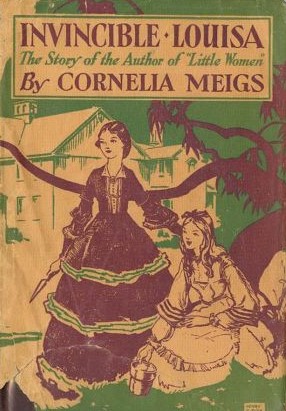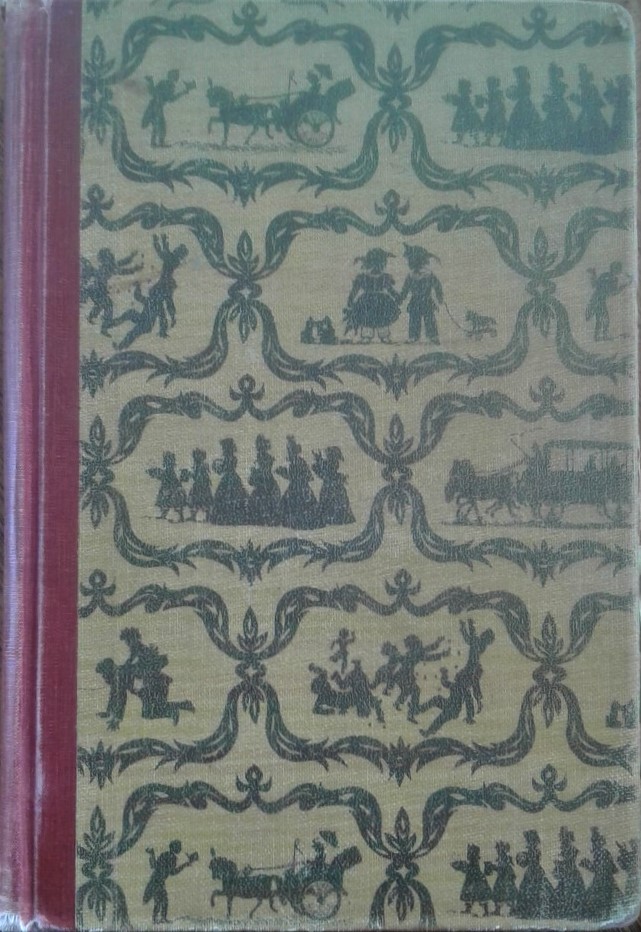
“Excited and delighted by her first success [a play called “Duke Roderigo”], Louisa worked away in the little room, writing more and more dramas of the same sort. So many plots came crowding to her brain that from plays she overflowed into stories of the same grandiloquent sort. They were cut out, as the boots had been, by the pattern of what she imagined the life of the high nobility to be, and they were put together in the same industrious ingenuity.”
In her 1933 biography Invincible Louisa, Cornelia Meigs writes this about Louisa May Alcott, who was in her early teens when she and her sisters performed her play. At about this same time, Alcott made her life plan and,
vowed to herself that she would give these beloved ones what each one needed. There was to be security for her father, peace and comfort and a ‘sunny room’ for her mother, opportunity for Anna, care for Beth, education for May. One of the most interesting tales in the world is the record of how resolutely Louisa kept that promise and how, no matter what things went against her, she always refused to be beaten.
Meigs follows this theme faithfully throughout her story of Alcott’s life. There may be other biographies of Alcott that psychoanalyze her more deeply, but this book is for children. Meigs obviously admires Alcott and wants others to do the same.
She doesn’t flinch in relating how difficult life was for the Alcott family. She tells us that in the first 28 years of Louisa’s life, the family moved 29 times. They were constantly short of money, and often in need of food and clothing. Louisa was often worried about how worn out and worried her mother was. As in Little Women, father is a rather vague figure, and we might wonder what he is doing all this time. But, Meigs chooses to stress the close relationship between all the members of the family, rather than assigning blame for their hardship, which I feel sure Alcott would have appreciated.
The book isn’t pure encomium. Neither is Meigs an iconoclast, as the current fashion is in biographies. She wants to give young readers an admirable heroine to emulate, which she does with good balance. We’re not given the impression that Louisa never gets frustrated and doesn’t kick against the goads in her life. Meigs is honest about Louisa’s prickles, as Jo March is about hers. But Meigs continually points to how the family was able, through humor and their love for each other, to overcome hardship. This is an excellent starting point for a competent middle-grade reader who is interested in the life of one of our beloved authors.
I wish I could personally thank Meigs for the most straightforward definition of Transcendentalism I’ve ever heard: “the life in which honesty, sincerity and unselfishness and all things of the spirit were to be the rule instead of things of the body.”
Some of my favorite quotes:
“Very few are the courses in education which allow time to think; but this education of Bronson’s was complete, even to that final need.”
“There was a day in the autumn when Louisa had gone out for an early run and stood at the summit of a wooded ridge, to watch the day break above the river. The maples were scarlet and the birch trees gold, all about her; the morning was absolutely still, there was a thin mist over the low meadows beyond which the sun was coming up. It was a moment of such complete and unbelievable beauty that it made her suddenly feel that she was transformed into a different person. She said afterward that she never understood God so fully as she did at that second, and that she understood Him forever after, from having realized, all at once, the beauty of the world which He had given her to dwell in. She went home with something new in her heart which she was never to lose.”
“It is hard to think of ‘Little Women’ as read for the first time; it is, to us, a tale so hallowed by the association of our mother’s and our grandmother’s delight in it, before our own day. A completely fresh story it was to them, a book even of a kind different from anything they had read before, a book just about themselves, so it seemed, by some one who understood them completely. It is no wonder that the first readers were enchanted with it.”

“When she died, she did not know that Bronson Alcott had gone just before her. What she did know was that she had taken care of him to the very last of his needing her, that she had been able to guard and protect and watch over the entire family. That, indeed, was a happy ending; that was the whole of what she had wanted from life,–just to take care of them all.”
You can find out more about this book at biblioguides.com.